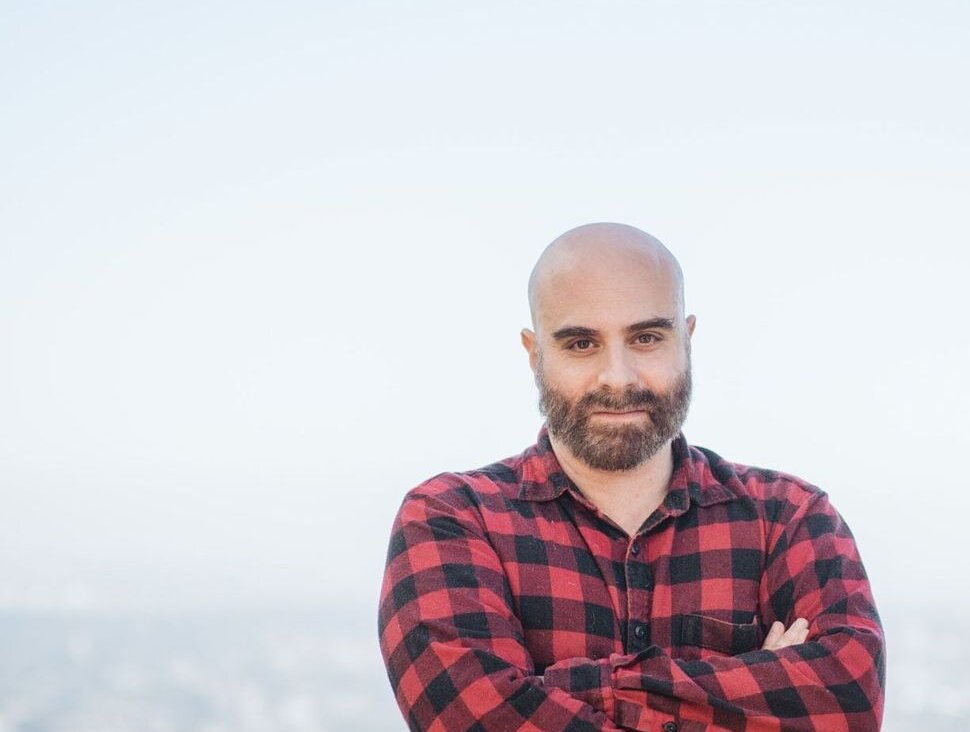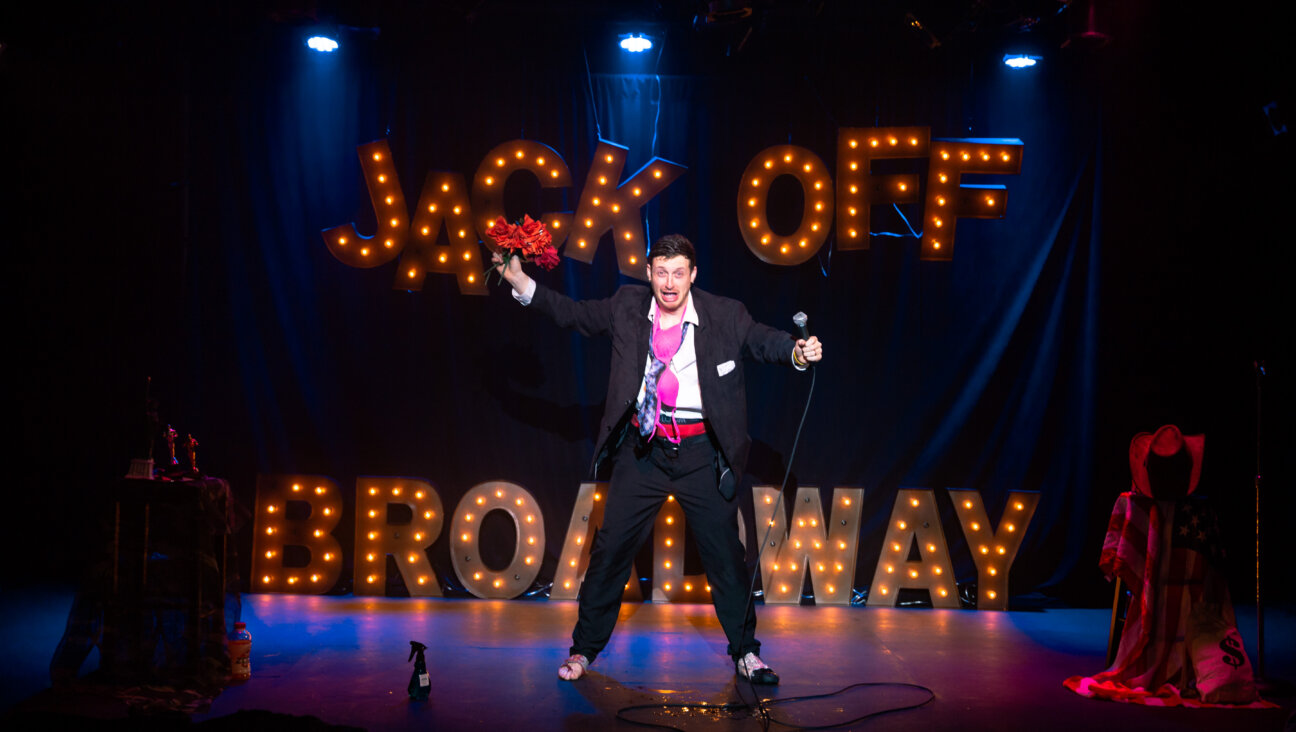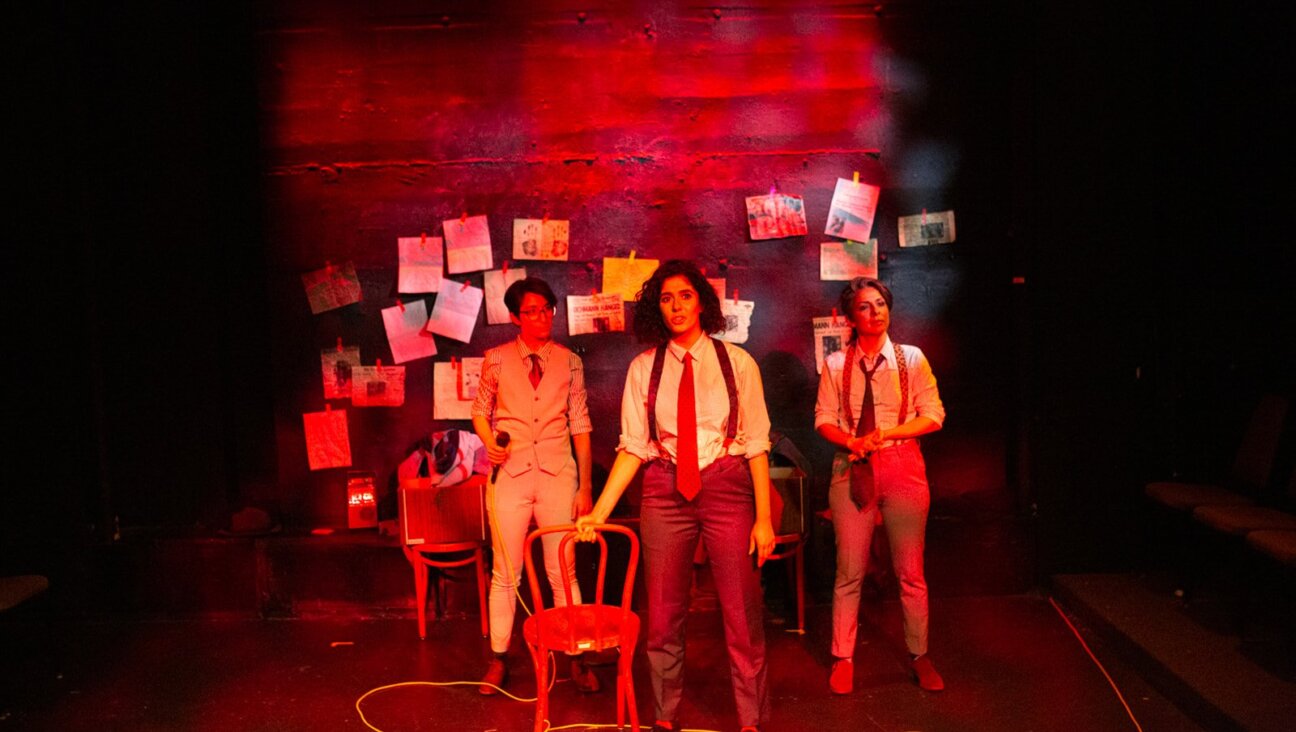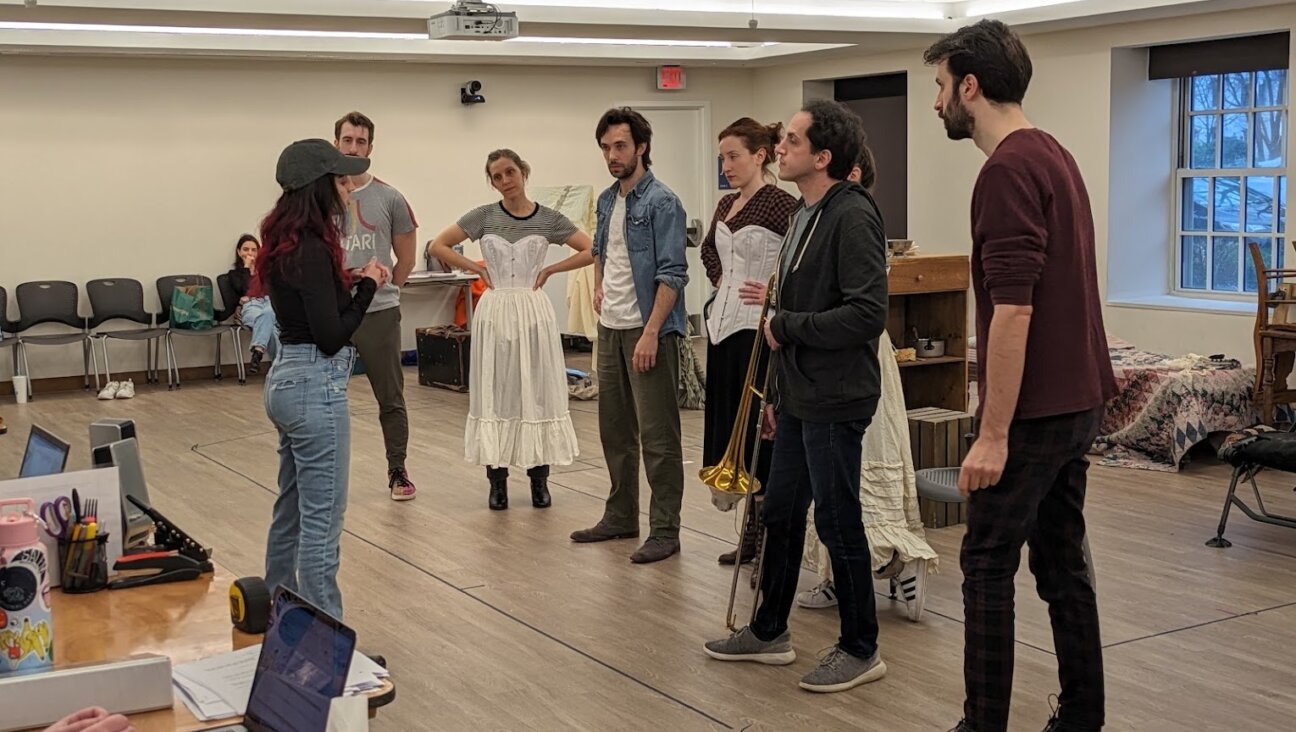Q&A With ‘The Band’s Visit’ Author Itamar Moses

Image by Courtesy of Itamar Moses
Based on one of Israel’s most celebrated movies — the multiple Ophir-winning “Bikur HaTizmoret” (“The Band’s Visit,” 2007) by Eran Kolirin — “The Band’s Visit” is this year’s surprise Broadway hit.
The musical features Tony Shalhoub (“Monk” and “The Marvelous Mrs. Maisel”) playing — and singing! — alongside Katrina Lenk (who recently starred in “Indecent”).
Itamar Moses, who wrote the book for the musical, is one of America’s brightest young writers. He has written television shows (TNT’s“Men of a Certain Age” and HBO’s “Boardwalk Empire,”), original plays (“The Four of Us”), adaptations (“Fortress of Solitude” — with Michael Friedman) and other musicals (“Nobody Loves You” — with Gaby Alter),
Dan Friedman, the Forward’s executive editor, sat down with Moses, some food and a few select guests at an Italian restaurant in New York’s Theater District to discuss “The Band’s Visit.”

Image by Courtesy The Band's Visit Musical
Dan Friedman: Tell us the story of “The Band’s Visit.” But without spoiling it!
Itamar Moses: It’s based on an Israeli film of the same name from about 10 years ago and the film is about a group of Egyptian musicians, they are a police orchestra who go to play a concert in a large Israeli city but, because of a miscommunication, they end up in a tiny town in the middle of nowhere instead of the city they were supposed to go to. And so the story is about that event, the connections that form between the Israeli townspeople and these Egyptian musicians over the one night that they are stranded in that town.
How did you get involved with this project?
Through the producer Orin Wolf. There’s a film festival in New York every year called The Other Israel Film Festival on the Upper West Side of Manhattan. And whenever the movie came out, Orin saw it there. And he claims that as soon as the credits rolled he turned to his wife and said “This needs to be on stage.” This needs to be a play or musical. So it was his idea. First it took some years to acquire the stage rights. He had to convince Eran Kolirin the Israeli filmmaker [writer and director of the original film]. I’ve met Eran a few times now. As a typical long-suffering Israeli artist Eran tells it this way: “He comes to me says he wants to make a musical. But the only musical I know is Cats. So I think he’s going to dress everyone as cats… it’s not a good idea.” So he had to approach Eran quite a few times before he got the rights and it was only after that I got involved. One day I got an email about coming in to have a meeting about the project.
I think they called me because I was a playwright in New York who’d been there for a decade or more, I had a few plays Off-Broadway [“Bach at Leipzig,” “The Four of Us,” “Completeness”] and a couple of musicals [“Nobody Loves You,” “Fortress of Solitude”] and I had an Israeli name! And they thought, “This guy has Israeli parents” — which I do — and that got me in the room! So we met, they sent me the film and said, “Watch this.”
So I did. And I don’t know that I’d have had the same reaction Orin did. I don’t know if I’d seen it cold I’d have thought it would be a musical, but in that context I could see why it might work.
Had you worked with David Yazbek [who wrote the music for “The Band’s Visit”] before?
I knew Yazbek by reputation, of course for his work on “The Full Monty,” “Dirty Rotten Scoundrels” and “Woman on the Verge,” but our first conversation was a phone call about this project. They’d been talking to me about writing the book and him about the music and they set us up for a phone date.
It turned out that we both had the same idea about what was interesting about it. Later we talked about going into the phone call and thinking that if the other one wasn’t on the same page as me I don’t think this will be a good idea.
Because the movie is very quiet, very spare, with a lot of long silences. The empty desert, the wind. It’s not what you think will make a musical. But that’s the reason to do it. Because it’s the opposite of what you expect. Something unusual and interesting. And we both found ourselves saying the same thing.
In the show the band intend to go to Petakh Tikvah but end up in Beit HaTikvah. That tiny desert town is based on a town called Yeruham, I believe. Have you been there?
Because my parents are Israeli and I have a lot of relatives there, I have been to Israel many times over the years. But more to Haifa and Ra’anana. But never before to Yeruham. It is literally in the middle of nowhere. In the middle of the desert.
We went this past summer, after the musical had finished its Off-Broadway run but before it went to Broadway. Me and David Yazbek and David Cromer the director, Katrina Lenk the female lead and a couple of the other actors — we all went to Yeruham where the movie was shot.
On our way there, a very funny thing happened which was perfect for our understanding of the place. Every Israeli we spoke to on our way had the same reaction. At the airport and everywhere after they would ask, “Where you going to go?” And when we said “Yeruham.” They would look blankly at us and ask “Why?” It happened maybe 4 or 5 times. The same like “Why?!”
Then, when we got there, it was bleakly beautiful. It’s tiny. From the town center, if you walk two blocks the towb just ends. There’s a bench there, just looking out to nothing. There’s a sign which is a drawing of the town expansion, but the dates have been pasted over a few times; it says that there will be new buildings in 2019, but you can see that the 2019 is pasted over 2018, is pasted over 2017 and so on.
The show has a very strong sense of place, but how does that play into Middle East geopolitics?
In the film, when the musicians sit down to eat at the restaurant, one of them sees a photo of a tank on the wall, so he takes his hat off and, puts it on top of the photo, thinking “This isn’t going to help us right now.”
So we couldn’t literally do that in the play because the genre doesn’t have that degree of visual granularity. But we tried to do something equivalent.
The inherent situation creates an expectation in the audience that there’s going to be suspicion, there’s going to be tension, there’s going to be conflict. Which is an enormously useful tool. Because you can either satisfy or not satisfy that expectation.
We did have this conversation all along. Whether and and to what degree this was political. And we came to agree that the situation is so inherently political that this story makes its political statement not by avoiding politics but by demonstrating when you strip away artificial, human-creations like national border, political rhetoric. That humans, reduced to basic human needs: I need lunch and I need a place to sleep tonight, when you simplify things to that level, basic human connections become possible. There’s a political statement of universality of certain things that transcends. I mean actually these people share a lot of culture. But languages, food, music, love are above all that.
I love “Oslo” but this isn’t “Oslo!”
Talking about language, this is a show where the protagonists all speak different languages, Arabic or Hebrew. So how do you go about making an English musical about two non-English speaking groups?
So the movie has subtitles, it’s in three languages. Actually, that leads us to a story about the movie, it won a bunch of Ophirs — kind of the Israeli Oscars —but it was famously ruled ineligible for the best foreign film Oscar here because there’s a rule about the percentage of dialogue that can be in English. And it turns out that it was too high, maybe 51% or something.
That’s some sort of great historical irony.
So the movie has subtitles. As a convention for movies that’s fine, but not for stage. I felt very strongly that I didn’t want the audience spending their time in the theater reading supertitles. Also it becomes a formal game with the audience, where we ask, would it be possible to keep the dialogue in the languages. So the people talk to each other in Arabic and we keep it in that language and we don’t translate it. We keep hidden languages hidden, but all the important cross-cultural conversations are in English. Can we never translate anything, but keep the audience in the story?
Two people have an argument in Hebrew, but we don’t need to know anything more than these two people are mad at each other and we basically know why. And it basically worked. It was a process, through previews and then the Off-Broadway run and then now, we keep nudging things.
Mystery is good, intrigue is good. Feeling curious is good. But feeling frustrated and left out: not good. We had to stay attuned to how the audience was feeling.
There’s another funny story. The director got an angry letter from someone who had seen the show on Broadway demanding his money back and wanting to come and see the show again when supertitles were working!
Also, I like that it kind of puts the audience in the same position as the characters. You’re always shut out of something, and that’s useful for empathy.
Also, finally, as well as language and music, there’s the silence, the quietness. How do you balance that?
Well, it’s in the film, there’s a lot of long silences in the film. And, maybe perversely, it’s something Yazbek and I were both interested in it. Putting that, the opposite of what you’d expect, in a musical. We also benefitted from landing with right director. David Cromer did a celebrated production of “Our Town” that was just transcendently good. His work always has this quality of finding drama in the seemingly mundane. He has this great way of being able to remind actors that life is inherently dramatic. You don’t need someone to be kidnapped or drop a bomb, life is dramatic because no one knows what’s going to happen. You actually don’t know. You ask someone a question and you don’t know what they are going to say! He’s great at mining that. So this was perfect material for him.
It’s easy enough for us to add pauses to the show. But to have those pauses be full and know exactly which ones to keep, I think that requires a really skillful director.
This interview has been edited and condensed for style and clarity.

I hope you appreciated this article. Before you go, I’d like to ask you to please support the Forward’s award-winning journalism this Passover.
In this age of misinformation, our work is needed like never before. We report on the news that matters most to American Jews, driven by truth, not ideology.
At a time when newsrooms are closing or cutting back, the Forward has removed its paywall. That means for the first time in our 126-year history, Forward journalism is free to everyone, everywhere. With an ongoing war, rising antisemitism, and a flood of disinformation that may affect the upcoming election, we believe that free and open access to Jewish journalism is imperative.
Readers like you make it all possible. Right now, we’re in the middle of our Passover Pledge Drive and we need 500 people to step up and make a gift to sustain our trustworthy, independent journalism.
Make a gift of any size and become a Forward member today. You’ll support our mission to tell the American Jewish story fully and fairly.
— Rachel Fishman Feddersen, Publisher and CEO
Join our mission to tell the Jewish story fully and fairly.
Our Goal: 500 gifts during our Passover Pledge Drive!
























